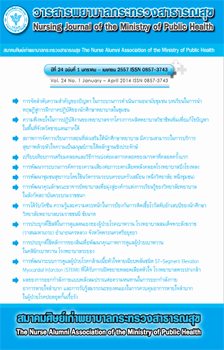ความพึงพอใจในการปฏิบัติงานของพยาบาลจากโครงการผลิตพยาบาลวิชาชีพ เพิ่มเพื่อแก้ไขปัญหาในพื้นที่จังหวัดชายแดนภาคใต้*
Main Article Content
Abstract
การวิจัยครั้งนี้ เป็นการวิจัยเชิงบรรยาย แบบภาคตัดขวาง โดยมีวัตถุประสงค์เพื่อศึกษาความสัมพันธ์ของ ความพึงพอใจในการปฏิบัติงาน กับความยึดมั่นผูกพันในองค์การ การรับรู้ในการสนับสนุนขององค์การ และ พฤติกรรมภาวะผู้นำของพยาบาลจากโครงการผลิตพยาบาลวิชาชีพเพิ่มเพื่อแก้ไขปัญหาจังหวัดชายแดนภาคใต้ กลุ่มตัวอย่างคือ พยาบาลวิชาชีพจากโครงการผลิตพยาบาลวิชาชีพเพิ่มเพื่อแก้ไขปัญหาจังหวัดชายแดนภาคใต้ จำนวน 344 คน สุ่มตัวอย่างแบบชั้นภูมิจำแนกตามจังหวัด สถิติที่ใช้คือ สถิติเชิงพรรณนาเพื่อจัดหมวดหมู่ และ อธิบายลักษณะพื้นฐานทั่วไปของกลุ่มตัวอย่าง วิเคราะห์ความสัมพันธ์ระหว่างความพึงพอใจในการปฏิบัติงาน กับ ความยึดมั่นผูกพันในองค์การ การรับรู้ในการสนับสนุนขององค์การ และพฤติกรรมภาวะผู้นำ ด้วยสัมประสิทธิ์สห สัมพันธ์เพียร์สัน วิเคราะห์เปรียบเทียบคะแนนเฉลี่ยความพึงพอใจในการปฏิบัติงาน กับปัจจัยส่วนบุคคล ด้วย Independent t-test และ One-way ANOVA และเมื่อพบว่าค่าเฉลี่ยมีความแตกต่างอย่างน้อย 1 คู่ ทำการเปรียบ เทียบรายคู่ ด้วยการทดสอบ Scheffe ผลการศึกษา พบว่า ความพึงพอใจในการปฏิบัติงานมีความสัมพันธ์กับ พฤติกรรมภาวะผู้นำ ความยึดมั่นผูกพันในองค์การ และการรับรู้การสนับสนุนในองค์การอย่างมีนัยสำคัญ ทางสถิติที่ระดับ .05 (r = .24, r = .23 และ r = .11 ตามลำดับ) ดังนั้นผู้บริหารหรือหัวหน้าฝ่ายการพยาบาลควร มีนโยบายหรือจัดทำโครงการที่สร้างเสริมพฤติกรรมภาวะผู้นำ และความยึดมั่นผูกพันในองค์การให้กับพยาบาล กลุ่มนี้ เพื่อเป็นการสนับสนุนความพึงพอใจในการปฏิบัติ เมื่อความพึงพอใจในการปฏิบัติงานในระดับสูง ผลที่ตาม มาคือ การลาออกหรือโอนย้ายน้อยลง พยาบาลก็จะปฏิบัติงานด้วยความมุ่งมั่น กระตือรือร้น มีขวัญและกำลังใจ ที่ดี เกิดการทุ่มเท เสียสละทั้งแรงกาย แรงใจ และสติปัญญาให้กับการทำงาน ส่งผลให้งานขององค์การประสบ ผลสำเร็จทั้งเชิงปริมาณและคุณภาพ
Job Satisfaction of Nurses from the Southern Nursing Shortage Problem Solving Project*
Kannika Ruangdej**
Paiboon Chaosuansreecharoen***
Suchat Sungkeao****
Abstract
This descriptive research with cross-sectional studies aimed to investigate the relationship between nurses’ job satisfaction and the following independent variables: organizational commitment, perceived organizational support, and leadership behaviors. The sample was composed of 344 nurses selected from the Southern Nursing Shortage Problem Solving Project using stratified random sampling technique. Descriptive statistics were used to categorize and explain demographic data. Pearson product-moment correlation coefficient was utilized to determine if the correlation existed between the dependent variable and the independent variables. Independent t-test and one-way ANOVA were used to compare nurses’ job satisfaction by demographic variables. Scheffe’s test was used for multiple comparisons. The findings revealed that nurses’ job satisfaction was significantly associated with organizational commitment, perceived organizational support, and leadership behaviors at a p value < 0.05 (r = 0.24, r = 0.23 and r = 0.11, respectively). Therefore, the chief executive officers or head nurses should have policies or programs to foster leadership behaviors and organizational commitment to enhance nurses’ job satisfaction. When nurses are satisfied with their job, it would increase organizational performance and reduce the new nurse turnover rate. In addition, satisfied nurses tend to be more productive, creative, committed and will eventually contribute to higher quality patient care and patient satisfaction. They will tend to care more about work quality and have more drive to achieve and enthusiasm to work. They will generally be more productive.
* Funding by the Nurse Alumni Association of the Ministry of Public Health
** Registered Nurse, Sirindhorn College of Public Health, Yala
*** Director, Sirindhorn College of Public Health, Trang
**** Registered Nurse, Sirindhorn College of Public Health, Yala
Article Details
บทความและรายงานวิจัยในวารสารพยาบาลกระทรวงสาธารณสุข เป็นความคิดเห็นของ ผู้เขียน มิใช่ของคณะผู้จัดทำ และมิใช่ความรับผิดชอบของสมาคมศิษย์เก่าพยาบาลกระทรวงสาธารณสุข ซึ่งสามารถนำไปอ้างอิงได้
